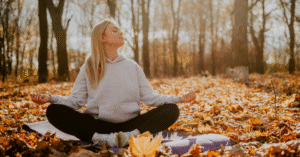A few years ago, I started waking up just a little earlier—not dramatically, just enough to drink my tea in silence and move through a short yoga flow before the day pulled me in.
I didn’t expect much.
But what I gained wasn’t just more time—it was steadiness.
And since then, I’ve noticed a quiet power in the people who approach their mornings with rhythm and intention.
Whether it’s meditation, journaling, a run, or simply the same breakfast at the same table, there’s something different about people who stick to a morning routine.
Their energy feels rooted.
Their days feel less reactive.
And over time, that consistency shapes not just what they do—but who they become.
As leadership expert Robin Sharma reminds us, “The way you start your day determines how well you live your day,” a truth I’ve seen play out again and again in real life.
Here are the strengths I’ve seen most often in people who treat their mornings as sacred ground.
1. They have emotional steadiness
People with a consistent morning routine tend to move through the day with fewer emotional spikes.
They’re not immune to stress, but their baseline is calmer.
There’s something about starting the day with clarity—rather than chaos—that makes space for better reactions later.
It’s not about avoiding feelings.
It’s about having the stability to respond, not just react.
A slow, intentional morning can work like an emotional buffer.
You meet the world from a place of presence, not panic.
Compellingly, a 2021 University of Colorado Boulder study noted that “being a morning type… corresponded to a 23 percent lower likelihood to have a major depressive disorder per one‑hour earlier sleep midpoint,” underscoring how morning habits can bolster mental health.
2. They build trust with themselves
Sticking to a morning routine—even a simple one—is a form of self‑trust.
It’s the quiet agreement: “I’ll show up for myself.”
And when that’s repeated day after day, it builds internal credibility.
You don’t just hope you’ll get things done—you trust that you will.
That trust becomes a foundation.
It makes it easier to follow through on harder things later, because you’ve already proven you keep your word to yourself.
3. They protect their energy
One thing I’ve learned: not everyone deserves access to you first thing in the morning.
People who commit to a routine know this instinctively.
They don’t wake up and scroll. They don’t check emails before they’ve checked in with themselves.
They understand that energy is not just a resource—it’s a responsibility.
Guarding those first few moments of the day often means they have more to give later—without feeling depleted.
4. They cultivate discipline through small acts
Discipline isn’t just waking up at 5 a.m. or doing 100 pushups.
Sometimes, it’s rinsing out your mug or making your bed or sitting still for five minutes—even when you don’t feel like it.
That daily follow‑through, even in micro‑doses, adds up.
Morning routines quietly train you to stay committed—especially on the days you’d rather not.
And that kind of self‑leadership spills into everything else.
The philosopher‑historian Will Durant captured this perfectly: “We are what we repeatedly do. Excellence, then, is not an act, but a habit.”
Those small, consistent actions forge character more reliably than any burst of heroic effort.
5. They’re more in tune with their body
If you’ve ever meditated, stretched, or just taken a slow breath before breakfast, you’ve probably noticed this.
Morning routines that include any kind of physical awareness tend to deepen your connection with your body.
And that’s a big deal.
Because the body carries information the mind often skips.
This idea crystallized for me after reading Laughing in the Face of Chaos by Rudá Iandê.
He writes, “Your body is not just a vessel, but a sacred universe unto itself, a microcosm of the vast intelligence and creativity that permeates all of existence.”
His insights reminded me that mornings aren’t just mental resets—they’re a chance to listen to the wisdom beneath the noise.
That wisdom often shows up as tension, fatigue, hunger, or stillness.
People with routines learn to notice.
6. They tend to lead, not follow
When you wake up with intention, you’re less likely to be swept into someone else’s agenda.
People with morning routines tend to start the day proactively, not reactively.
They choose their priorities.
They decide how they want to feel.
This creates a sense of agency that often shows up as quiet leadership—not necessarily in loud or flashy ways, but in steady, thoughtful decision‑making.
Others notice.
Because in a world of noise, someone who moves with grounded direction stands out.
7. They make space for reflection
Consistent mornings often include at least a few moments of stillness or solitude.
That space isn’t just relaxing—it’s generative.
It gives people time to process, to imagine, to realign with what matters.
I’ve kept a morning journal for years—not every day, but often.
Some entries are just a list of tasks.
Others are messy, half‑formed thoughts.
But the habit itself keeps me close to my inner life.
People who make space to reflect are usually more intentional in their choices.
And they tend to feel less lost because they’re regularly checking in, not just checking out.
8. They’re less attached to perfection
Interestingly, the people I know with long‑term morning routines aren’t rigid.
They’re consistent, but they’re also forgiving.
If they miss a day, they don’t spiral.
If they need to adjust something, they do.
Their strength lies not in perfection—but in returning.
This flexibility is part of what makes the habit sustainable.
And it teaches something subtle but powerful: you don’t need to be flawless to be faithful.
Just steady.
Just willing to begin again.
I want to share one last insight before we wrap up…
A morning routine won’t solve everything.
But it will shape you.
Not just in what you get done, but in who you become through the act of consistent self‑respect.
Again, reading Rudá Iandê helped me see that deeper truth.
His work is less about productivity and more about presence—about shedding old beliefs and learning to meet yourself honestly, especially in the quiet spaces.
If mornings have been chaotic or inconsistent for you, maybe start with one gentle thing.
A stretch.
A glass of water.
A slow breath.
The strength isn’t in the ritual.
It’s in how you show up to it.
Final thoughts
People who follow a morning routine consistently tend to carry something unshakable with them into the world.
Not superiority.
Not rigidity.
But quiet strength.
The kind that comes from knowing what grounds you—and choosing to begin there, again and again.
So ask yourself:
What kind of energy do I want to meet the day with?
And what’s one small habit I can start tomorrow to meet it on purpose?
















